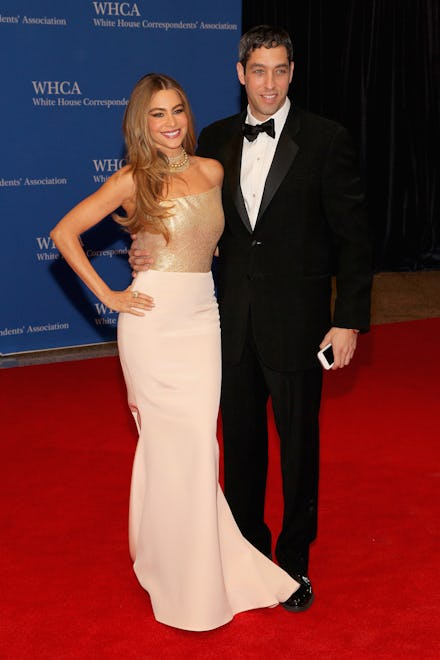Sofía Vergara's Ex-Fiancé's Pleas Over Their Frozen Embryos Is Completely Problematic

Sofía Vergara's ex, Nick Loeb, penned a groveling op-ed in the New York Times on Wednesday, giving readers insight into why the Hollywood star dumped him while revealing the profoundly problematic language we use when discussing women's bodies when it comes to procreation.
In "Our Frozen Embryos Have a Right to Live," Loeb sheds some phenomenal, egotistical male tears in order to garner the reader's sympathy, for the reason, it seems, to do nothing less than to shame Vergara — since the New York Times reader, as sophisticated as she may be, cannot legally adjudicate in Loeb's favor. Basically, Loeb wants full rights to the two embryos the couple created while they were together, while Vergara doesn't. He quotes Vergara's lawyer as saying she "wants to keep the embryos 'frozen indefinitely.'"
Loeb's op-ed is straight out of Pro-Life Rhetoric 101. As Gawker contended, the New York Times printing it showed questionable judgment. But, more significantly, it is a signpost of how men view women — as machinic baby-makers. Loeb's petulant man-cry resonates with a larger discourse around the objectification of women as nothing more than baby-making machines, which Mic's Elizabeth Plank recently explored.
Loeb on personhood: Loeb begins the piece with a number of questions equating embryos with life: "When we create embryos for the purpose of life, should we not define them as life, rather than as property? Does one person's desire to avoid biological parenthood (free of any legal obligations) outweigh another's religious beliefs in the sanctity of life and desire to be a parent?" He claims that these "issues" are "unlike abortion" because they "have nothing to do with the rights over one's own body, and everything to do with a parent's right to protect the life of his or her unborn child."
Actually, these issues are quite like abortion because this is about a woman's rights over her own body. Loeb, here, collapses time — the time of fertilization and carrying the embryo to term — so to erase the very real biological difference between an embryo and a "life," which he then, just sentences later, cunningly refers to as an "unborn child."
Vergara is not ethically or, as he even admitted, legally bound to give him babies. They are no longer a couple, and, even if they were, she has zero "legal obligations" to be the source for his "dream[s] of being a parent."
In what may be the most melodramatic expression of male tears to grace the New York Times, Loeb shares his woeful story of having divorced parents and being raised by an "Irish Catholic nanny," who died last month. He adds that when Vergara broke up with him (quelle surprise!) "his dreams of a family were shattered."
"I pray that it won't be too late for my father, who will be 85 in May, to see his grandchildren," he laments.
Adding to the audacious argument, he paints Vergara as a career woman who wouldn't heed Loeb's "ultimatum" to fertilize the embryos. After they split, he said, "I asked her to let me have the embryos, offering to pay for all expenses to carry our girls to term and raise them." The pro-life language returns again in calling the embryos, "our girls."
The closing sentence is a pro-life call to action: "This is not just about saving lives; it is also about being pro-parent."
This op-ed bespeaks the language that has been used to attack women's reproductive rights. In this worldview, women's bodies and desires come second to the potential life, which is nonexistent but deemed an "unborn child."
Ultimately, Loeb pretends he's not making a pro-life argument, but he is. And the crucial missing link is his view of the woman's body — not just Vergara's, but the female surrogate who would gestate the embryo, nourish it and bring it to term. But in the end, neither Vergara nor a hypothetical surrogate owe him anything — and that certainly includes his dream of parenthood.